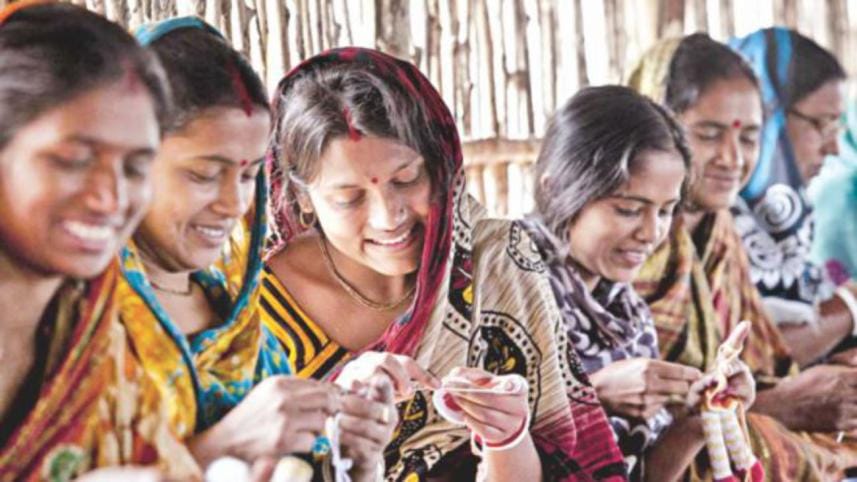To help women entrepreneurs, men should first change themselves

When I set out to research masculinity and entrepreneurship in Dhaka, I expected to hear the occasional sexist remark. Instead, I was surprised to find that the men I worked with were often eloquent defenders of women's rights, explaining to me in detail the religious, cultural, and familial barriers women entrepreneurs faced in Bangladesh. When I asked about gender, everyone, it seemed, had an answer for why there are not more women entrepreneurs.
However, my optimism faded as I realised men's answers didn't extend to critical reflection on themselves. In practice, describing the cultural barriers against women only served to absolve men of their sexist practices in creating that culture, positioning "culture" as a past-tense structure that their present-day actions could not alter. Often, it displaced blame solely onto women themselves for not being innovative or competitive enough to succeed as entrepreneurs.
For example, men would tell me that Bengali culture and religion kept women from being brave enough to start a venture, because women were sheltered and not exposed to the necessary risk true entrepreneurs need. But when I spoke to women about the difficulties they faced starting their ventures, rarely did they mention culture as a barrier. Rather, they made concrete and practical demands: to be taken seriously in a meeting, and not assumed to be the assistant of their male employees. To go to a business meeting alone without being sexually propositioned or harassed. To attend a job interview without being asked about their marital status. While occasionally culture was invoked to legitimate these demands, all of these complaints were rooted in men's everyday actions of exclusion which marked women as different and out-of-place in business—not an amorphous culture that socialised women to be less risky.
Similarly, I once attended an entrepreneurship symposium where all of the speakers were male. It went completely unremarked that not a single woman spoke for the first three hours of the programme. However, during the interactive portion at the end of the session, when the floor was opened to audience members, mostly women contributed their ideas. Suddenly, the moderators began making jokes. "Where are the men? Come on guys, step up!" they laughed. While perhaps good-natured, these comments normalised the all-male panel and othered women's voices as out-of-place and taking up too much space.
Part of the problem is also events and programmes designed to help women. While these can offer useful resources and sources of recognition for women, they also pigeonhole women as intrinsically morally worthier or thriftier than men. The often cited (though unverifiable) statistic that women invest more back into their communities and families reinforces this ideal of women as moral mothers. While this stereotype can offer strategic advantage, it also excludes women from the pleasures of risk that men can access. Women are not morally-pure entrepreneurs; they are capable of the extremities of human fallibility, greed, and selfishness just as men are. In a context where being a bold risk-taker is venerated, we do women a disservice if we put them on pedestals and label them "safer bets", preventing them from the productive pleasures of struggle.
Programmes targeting women will thus do little to create more entrepreneurs unless men themselves begin to alter their own actions. Sexism grows not only in outright discrimination but in the quiet assumptions about who is capable of what. If men really want to help women be entrepreneurs, they should stop thinking about the difficulties women face, but think about themselves and their own actions. When they reach out to someone with an opportunity, who do they choose and why? When they choose to trust someone as a business partner, why is it? What assumptions do they make about the potential of women in their offices, or the labour they are expected to perform?
This self-reflection also requires shifting what is considered an innovative or exciting venture. Strikingly, the same men who would tell me it was a real shame that there weren't more women entrepreneurs would dismiss the entrepreneurial activities of women, especially with regard to clothing and crafts, as "basic" or not "innovative" enough. Those are just "side businesses" people would say, nothing serious or interesting. This dismissal of women's entrepreneurial ventures in organisations ostensibly designed to incite entrepreneurship reflects how deeply business is assumed to be a male space. The irony is that many of these supposed side businesses actually produce far more revenue than the publicly lauded (male) technology businesses, most of which struggle to turn a profit in Dhaka.
Most striking to me is men's seeming inability or refusal to examine how gender had shaped their lives. When I tried to ask about gender, men would immediately describe women's status and positioning. By presuming that "gender" means "women", men lose the chance to think critically about what it means to be gendered as male and grow up in a society that limits men's range of human expression. These limitations also hurt men, restricting their ability to share vulnerability or develop empathy, and foreclosing a broader imagination of who they can be.
Throughout Dhaka, both policymakers and universities proclaim that entrepreneurship can solve problems. Its possibilities, however, remain limited if people continue to be restricted by narrow, gendered expectations.
Dana McLachlin is an anthropology student at the University of Amsterdam.



 For all latest news, follow The Daily Star's Google News channel.
For all latest news, follow The Daily Star's Google News channel.
Comments